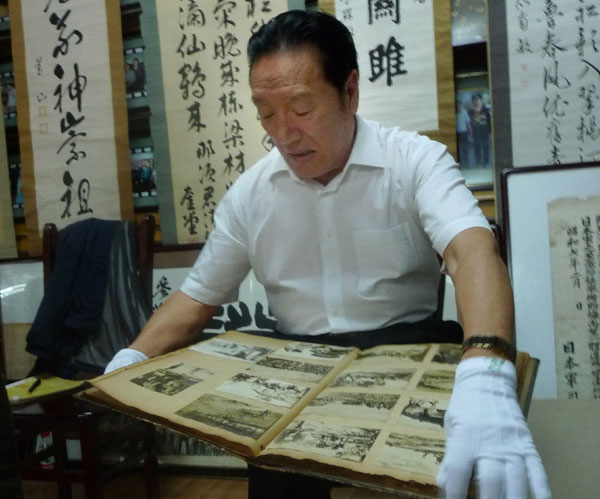Collector has 'proof' of atrocities
 0 Comment(s)
0 Comment(s) Print
Print E-mail China Daily, September 18, 2014
E-mail China Daily, September 18, 2014
A simple room in an apartment in Jiamusi, Heilongjiang province, serves as a powerful testimony to one man's determination - often against great odds - to set the record straight about the brutal reality of Japan's wartime aggression in the 1930s and 1940s.
 |
|
Song Jinhe, a 67-year-old retired cadre in Heilongjiang province, shows documents and photographs he has collected that feature Japan's historical aggression against China. Zhou Huiying / China Daily |
Song Jinhe, 67, a retired cadre, began to collect documents and photographs in the 1960s.
The graphic and chilling details of the nearly 10,000 items on display provide a powerful rebuttal to the Japanese political right wing's denials that the Japanese imperial army committed widespread atrocities.
The room has received more than 60,000 visitors since it opened on Aug 15, 2009, the 64th anniversary of Japan's surrender.
Among other things, it contains powerful evidence that the Mukden Incident - the rail bombing in 1931 that was used by Japan to justify its invasion of what was then called Manchuria - was premeditated and carefully planned.
"I was born in Jiamusi and grew up in this city. When I was a teenager, we received patriotic education from movies, speeches by old Red Army soldiers and stories told by older people," Song said.
"After the Mukden Incident, people in Northeast China began an extremely hard and bitter war against Japan. Although I didn't experience the terrible period, I have learned of countless atrocities that Chinese people suffered, especially in the Northeast."
The evidence, which includes a large number of secret documents, photographs, maps and letters from Japanese troops, was gathered over the last 50 years.
The letters include chilling firsthand accounts by Japanese troops.
"Yesterday, we killed six Chinese soldiers with bayonets in suburban Jiamusi," one soldier wrote, adding gruesome details about dead Chinese laborers.
"There are more than 30 corpses floating on the river, which made the air smell quite bad," he wrote.
Song doesn't speak Japanese, but the letters can be read, he said, because the Japanese language makes liberal use of Chinese characters.
"The soldiers' letters are easy to understand," Song said.
"I think the documents offer conclusive proof that the war was premeditated and aggressive. The letters and photographs are the most powerful evidence of Japanese atrocities."
Xing Zhonghui, an official of the Publicity Department of the municipal Party committee in Jiamusi, agreed that the items have great historical value.
"They have been authenticated as genuine. They include a secret order of operational readiness for the Mukden Incident, a letter from Okamura Yasuji (commander of the Japanese imperial army in China) and a Japanese flag with the signatures of commanders. These have great significance."
The Mukden Incident, a small explosion on a rail line that caused no damage - a train even passed on the line a few minutes later - was a staged event that gave the Japanese army a pretext to invade.
Song's evidence confirms that the incident was long planned. "The secret order is a powerful testimony that the Mukden Incident was premeditated and not an act of Chinese sabotage, as claimed by the Japanese."
Song faced numerous difficulties as he painstakingly gathered the evidence, rummaging through old book stalls and even piles of waste paper destined for recycling at a paper mill.
"In the 1970s, I got into a paper mill after imploring the porter. In a wastepaper warehouse, I examined bundles of paper, sifting through them individually. Suddenly, I came across a bundle of 53 letters all written by Japanese soldiers," Song said.
"During the war, the Japanese authorities sought to prevent leaks of confidential military information, as well as descriptions of arson, looting and murder committed by the Japanese military. Letters were often intercepted before they were mailed to Japan. This was one such interception."
The 53 letters record atrocities committed by the Japanese troops in Jiamusi from 1934 to 1936.
"The detailed descriptions of atrocities in the letters undermine the case of right-wingers in Japan who deny war crimes were committed," Song said.
"The evidence sets the historical record straight and shows us the ferocity of the invaders.
"I hope young people will remember the national horror and cherish peace more than ever."






Go to Forum >>0 Comment(s)